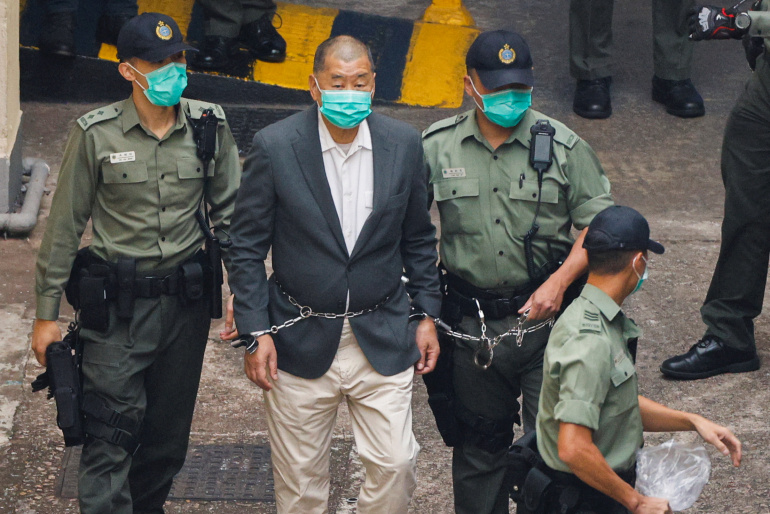Hong Kong children as young as six years old will be taught the “great importance” of the territory’s national security law and what constitutes foreign interference and subversion under new education guidelines for the city.
Beijing imposed the security law in June last year after tens of thousands of people took to the streets in opposition to a proposed extradition bill in 2019 in protests that evolved into calls for democracy and sometimes descended into violence.
The Education Bureau’s guidelines, released late on Thursday night, suggest Beijing’s plans for the semi-autonomous territory go beyond quashing dissent and aim to overhaul society and bring its most spirited city more in line with the Communist Party-controlled mainland.
“National security is of great importance. Teachers should not treat it as if it is a controversial issue for discussion as usual,” the guidelines said.
Teachers should “clearly point out that safeguarding national security is the responsibility of all nationals and that as far as national security is concerned, there is no room for debate or compromise”.
The guidelines include examples of “political propaganda” in schools – from wearing a badge with a political message to shouting slogans or “expressing certain political views demands” and offer teachers a range of suggested responses.
“In case of a grave/emergency situation, the school should report to the police immediately,” the guidelines said. Teachers and principals are also required to inspect noticeboards and remove library books that are considered a danger to national security.
Education Secretary Kevin Yeung said schools that failed to act on breaches of legislation could be held liable under the new guidelines, RTHK reported on Friday.
‘Affection’
Children in primary schools will learn how to sing and “respectfully listen” to the national anthem, learn about the police and the People’s Liberation Army as “protectors” of Hong Kong, as well as about the four main security law offences, including terrorism and secessionism.
In secondary schools, pupils will also learn about the offences which can lead to a life sentence, as well as the challenges and opportunities the Chinese nation faces. Hong Kong’s young people will also be expected to “develop a sense of belonging to the country, an affection for the nation, (and) a sense of national identity”, the guidelines say.
“Safeguarding national sovereignty, security and development interests is the constitutional duty of the HKSAR,” an Education Bureau spokesman said in a statement using Hong Kong’s official name.
“This is also the common responsibility of all Hong Kong residents (including school staff and students). Preventive efforts should be accorded priority in order to minimise the need for suppression and punishment. As far as prevention and education are concerned, schools have a significant role to play.”
The #HongKong Education Bureau has published a national security video for primary school children. Full story: https://t.co/O5OJIGSWBr pic.twitter.com/4xchg8532C
— Hong Kong Free Press HKFP (@hkfp) February 5, 2021
The essential (exclusively Han Chinese) members of our multicultural city:
blue-shirt, police officer, PLA soldier. pic.twitter.com/jUmBekn2gM
— Eliot Chen (@eliotchen97) February 4, 2021
Critics, including some lawyers, say the legislation’s language is broad and vague, and the range of activities authorities might see as potential threats to national security unclear and fluid.
Some 97 people have been arrested under the law since it was imposed, without a draft having been shared, on June 30 last year. Media tycoon Jimmy Lai, one of eight people formally charged, is being held in custody ahead of his trial on charges of foreign interference in April.
While the bureau says it accepts international and private schools do not use the Hong Kong curriculum of the government schools, it stresses they too have a responsibility “to help their students (regardless of their ethnicity and nationality) acquire a correct and objective understanding and apprehension of the concept of national security”.
The Education Bureau said it had approved new teaching materials to help schools, including an audio picture book, Let’s Learn about National Security, targeted at primary school children, and an animated video, which features a bespectacled owl.
 Media mogul Jimmy Lai, founder of Apple Daily, is one of eight people facing formal charges under the National Security Law [Tyrone Siu/Reuters]
Media mogul Jimmy Lai, founder of Apple Daily, is one of eight people facing formal charges under the National Security Law [Tyrone Siu/Reuters]
Hong Kong is also considering changes to schools’ “liberal studies” programme, after a previous attempt to introduce “national education” in 2012 failed following mass protests and school strikes.
Students, particularly in secondary schools, have taken an active role in protests and other forms of campaigning and some of Hong Kong’s most prominent activists, such as Joshua Wong, began their political engagement while still at school.





